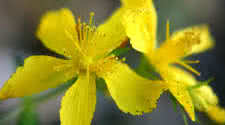St. John's Wort and Fertility

Advanced Supplements & Nutrition Science
Recent headlines screamed that St. John's Wort and other popular herbs could negatively affect fertility. The story made the news on television and on the Internet in February, growing from the original item in Fertility and Sterility and taking on a life of its own. The research
in question revolved around herbal supplements such as St. John's Wort, echinacea, ginkgo bilboa and saw palmetto.
These substances were tested at the Loma Linda (California) University School of Medicine by a team under Dr. Richard Ondrizek. Scientists mixed hamster eggs with each of several individual dissolved herbs, and then added human sperm to see what would happen. (Normally, human sperm
would penetrate a nonhuman egg, but would be unable to fertilize it.) At concentrations way below the normal human dose, none of the herbs had any effect on the sperm. At high doses - 10 times the recommended single dosage-ginkgo biloba, echinacea and St. John's Won damaged the
egg and sperm. When the sperm sat in the herbs for a week, its DNA was altered and some of its genes mutated.
Dr. Varro Tyler, author of Heths of Choice and Honest [lethal, was quoted by Jenifer Joseph of ABC NEWS as saying that this fertility study had "more holes in it than a piece of Swiss cheese." Tyler pointed out several weaknesses that led to some interesting questions. Do St.
John's Wort, ginkgo bilboa and echinacea, which are taken for a variety of conditions ranging from the treatment of colds to the improvement of mood and memory, even reach a person's reproductive system to have the same effect that they had in a laboratory dish? Since the strengths
of the herbs tested varied from bottle to bottle, how could the solutions be standardized in order to reach reliable results that applied to them all?
Dr. Alan Penzias, a Harvard reproductive endocrinologist, had more problems with the research, namely, whether a small study sample, such as that used in the Loma Linda test, would give an accurate outcome and whether the results of a test that wasn't repeated even once could be
trusted. (Large samples and repeatable results are just two of the hallmarks of a good testing method.) Further, if you combine eggs and sperm in a solution of anything- orange juice, for example - and let it sit in a petri dish for seven days, would the same kind of damage be done?
If it did, could you draw the conclusion that orange juice negatively affects fertility in human beings? The lesson bodybuilders should take from this overblown story is to he discerning when it comes to scientific "news" and be wary of premature reports. Look beyond the headlines,
Even Dr. Ondrizek admitted that the work was limited and that conclusions shouldn't be drawn from it. But that didn't stop the media from running with it.